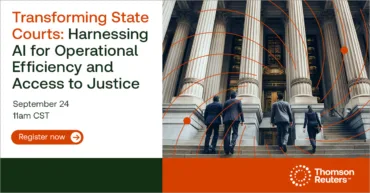In a recent blog post, we discussed how generative AI (GenAI) technology has evolved to be more thorough, accurate, and secure. Specifically, we examined how GenAI is being used in the U.S. court systems to aid judges, lawyers, and legal staff in conducting research, performing accurate legal analysis, and producing precise timelines. But it’s important to recognize that not all GenAI technology can rise to the challenge and meet the unique needs of the courts.
Jump to ↓
Get a GenAI solution for legal professionals
Use a GenAI solution that’s secure
Make sure it’s a GenAI solution that’s integrated
Use a GenAI solution that’s powered with ongoing training and support

White Paper
Doing it all - better and faster As technology advances, the benefits for early adopters will continue to multiply.
Access white paper ↗From increasing efficiency and productivity to reducing bias and human errors, the benefits that GenAI technology offers lawyers and court staff are obvious and abundant. But, to reap these benefits, it’s critical to select the right GenAI vendor. Let’s explore four factors that courts would be wise to consider when selecting a GenAI vendor and tool.
1. Get a GenAI solution for legal professionals
There are currently a multitude of GenAI tools on the market. And, in the coming years, the number of companies getting into the AI game is expected to grow exponentially. But not all GenAI tools are alike in their accuracy and capabilities or their ability to fulfill the unique needs of our legal and court systems.
To ensure a fair and just judicial process, it’s imperative that judges, lawyers, and court staff have access to GenAI tools that rely on legal resources that are accurate, thoroughly vetted, and from closed and trusted data resources.
2. Use a GenAI solution that’s secure
In addition to helping lawyers and staff complete a variety of legal tasks and processes effectively and efficiently, courts also need GenAI tools that are private and secure. And GenAI tools that pull from large open data sources don’t fit this model.
To ensure that legal citations and sources are the most up-to-date and accurate, it’s imperative that courts select a GenAI tool that uses retrieval-augmented generation. This means that only vetted legal materials – including case files uploaded by a user – are included, as source data which gives lawyers and legal staff confidence and peace-of-mind in their results.
3. Make sure it’s a GenAI solution that’s integrated
Court staff already rely on technology providers like Microsoft and trusted legal platforms like Westlaw and Practical Law to conduct research, draft documents, and aid in completing daily tasks.
And, to ensure the courts are able to continue to use the technologies they rely on and operate smoothly, it’s important to select a GenAI tool that has the ability to seamlessly integrate with these platforms and provide a single unified user interface.
4. Use a GenAI solution that’s powered with ongoing training and support
When choosing a GenAI vendor, it’s important to select a company that is established, trusted, and has a proven track record of providing legal professionals with the high-quality sources they need to do their jobs.
While a startup may promise to deliver a GenAI solution at a lower cost, consider whether that company has the ability to provide ongoing training and support or if they will even be in business next year. It’s important to select a vendor that will provide training for lawyers and court staff on not only the basics of how to use the tool, but also how to do so in a way that maximizes its capabilities to the fullest. Plus, a vendor should provide ongoing support and training if questions arise or new staff are hired in the future.
By quickly and effectively providing the answers and assistance lawyers and legal staff in our courts need to do their jobs, the right GenAI tool can help transform the efficiency and ease with which our courts operate.
Learn more about how courts are using AI.

CoCounsel
Bringing together generative AI, trusted content and expert insights
Meet your AI assistant ↗













